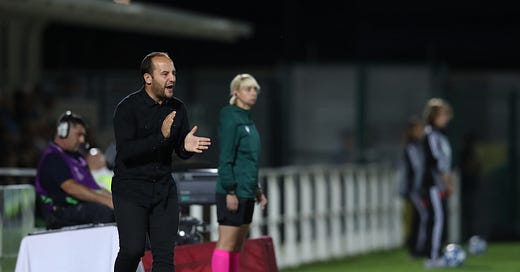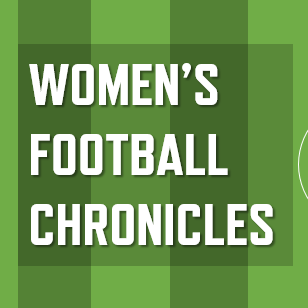The Big Interview: Lluis Cortés
Cortés went from Champions League winner to the middle of a war zone in six months. He speaks about the trials and tribulations of his journey, the ups and downs to WFC.
“When the war started, I lived the hardest experience of my life,” admits Lluís Cortés, the current head coach of the Ukraine women’s national team.
Just over 18 months have passed since Cortés become one of the youngest coaches to lift the UEFA Women’s Champions League when he led Barcelona to their first triumph on their European stage, but life has changed significantly since then.
The 36-year-old though is realistic enough to admit he is one of the “lucky ones” as his status within the UAF [Ukraine Association of Football] allowed him to leave the country at the onset of the war with Russia last year much easier than others, while many never got out at all.
Since managing to flee the country one year ago with his assistant Jordi Escura, Cortés has been living back home in Spain and has yet to return, but hopes the national team will be able to reconvene in April having not held a camp in the country since the war started last February.
Check out over 100 more unique stories in WFC’s Premium section, available for just £45 for 12 months, paid in one go, or a £6 a month rolling subscription.
All subscriptions come with a 7-day free trial to allow you to explore our full archive.
Plus, guarantee you everything that is to come over the next 12 months…
“The Ukraine national team is in a difficult moment, there is no denying that,” he says. “We didn’t meet with the team last October, last November and also in February we have not met.
“We are trying to arrange some friendlies in April, but if the federation can save this money, they will do it. But we need to get back together to start working, to improve the team. But we are not at the World Cup, so they say ‘we can save this money’, but I’m pushing hard to get some games in April.”
Even if he is successful, the squad will have to meet up outside Ukraine. Last year, they held camps in neighbouring Poland while they travelled to Faroe Islands and Spain for the team’s final World Cup qualifiers.
With no official matches scheduled now until the new UEFA Nations League starts after the World Cup, Cortés hasn’t seen his players since September, but played a vital role in helping to get many of them out of the country and into clubs around Europe so they could continue playing, with many contracted to domestic clubs within Ukraine.
“Football saved my life. We could leave thanks to football, and we know that…”
His reflections on just what it took to get out as Russia began to invade the country are stark as they are heart breaking, and he’s well aware of how many didn’t either get out in time or were never given the chance to.
“We had to leave. It was very hard because nobody knew what was happening. We knew Russia was coming close to Kiev, attacking the airports and key points in Ukraine. We tried to get to Lyiv in the west, but the army was coming, they wanted on day one to go to the centre of Kiev as soon as possible.”
He adds, “It was a hard experience. We were in a van, it was incredible, because it took 22 hours, if you go on Google it will tell you by road it is normally four or five hours. There were people walking, just trying to walk as far from Kiev as they could, going nowhere because they didn’t know where to go, just away from Kiev.”
When Cortés, his assistant and fitness coach, all from Spain, reached Lyiv, they arrived at 9am and by 10pm that same day started their journey to Poland to cross the border.
“We were on the train,” he recalls. “Normally it’s 90 minutes to where we were going, but it took 24 hours because the train had to stop many times. It was really crazy. It was a train full of sadness, a lot of women and children, there were too many people, but so much sadness. They had said goodbyes to their dads and partners, it was so hard to watch and to listen to. The whole trip, watching tanks go past the window the other way, it was all so hard. I got home and I said ‘I’m alive, I’m ok’, but it was still very hard after that.”
On then turning his attention to getting his players out of Ukraine too, Cortes says “We tried to help all of them as much as we could, to try and find teams for them around Europe. Football is their job, football is their life, teams everywhere helped.
“We were in contact with both UEFA and FIFA too who helped a lot. Nadine Kessler helped a lot, we spoke a lot, her team in UEFA changed the transfer window for us and allowed players to be signed from Ukraine. We found a team for 55 girls from the national team, the under 19 team and even some friends of these players. If a player calls me up and asks if I can help her friend to stay alive, of course I am going to do that.”
Some have since returned with the domestic league restarting despite the ongoing conflict, with Cortés admitting some were keen to return to help and support their families, some even wanting to help the army.
Understandably, things are very much not back to normal though, with the UAF having to go to extremes to get domestic games played again, with Cortés admitting it is difficult for him to plan anything right now with no end in sight to the war.
“It would be easy if they said the war will end on this date, but we don’t know,” he says. “The Nations League is good for us because the UAF will have no excuse to cancel the matches. We will meet with the team and use these FIFA dates to get back together.
“The power of football is incredible. The UAF and the government wanted to restart the season because they know the power of football. It keeps your society together, so everyone wanted to restart, both the men and the women, because it feels like going back to normality and they wanted to say to the world ‘ok, we are fighting a war, but we are trying to live our lives’.
“It was incredible when they told me because the first thing I asked was ‘how do you do it?’ but they said it was under control.”
How they do it is a stark reminder of the situation right now. Games are played in five or six venues outside the main conflict areas, all of which have a designated bunker.
“If the sirens start, both teams, staff and referees go to the bunker and when they stop, they warm-up for 15 minutes and restart the match. A match could last five or six years, there has been some examples of this already.”
Cortés is reflective on the past 12 months and the uncertainty of what is still to come, as he has a contract with the UAF until the summer of 2024.
“Football saved my life. It helped me and Jordi to leave the country in a more comfortable way. It was thanks to football because the UAF organised everything, the PZPN in Poland helped us a lot too. They booked our hotels, our flights from Poland to Spain, we could leave thanks to football, and we know that.”
It is easy to forget that just over 18 months ago Cortés was a Champions League winner, guiding an all-conquering Barcelona side to a historic treble, dismantling English champions Chelsea 4-0 in the 2021 final in Gothenburg.
Two years previous, Cortés, just months into his first senior club management job, had been on the wrong end of a similar score line when Lyon beat his Barcelona side 4-1 in Budapest, but over the course of two years turned the Catalan side into a giant.
Over the course of an hour, he opens up on his eclectic journey to the top, offers a unique insight into Barcelona and working with double Ballon d’Or winner Alexia Putellas, as well as that Champions League triumph, but his beginnings in football were much more humble and close to his roots, his local town of Lleida.
Keep reading with a 7-day free trial
Subscribe to Women's Football Chronicles to keep reading this post and get 7 days of free access to the full post archives.





